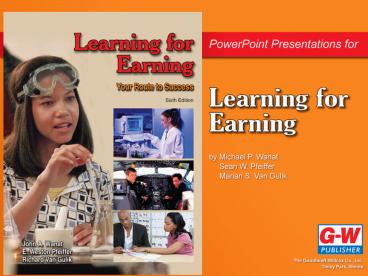Goodheart-Willcox Publisher | Learning for Earning | Chapter 1 - PowerPoint PPT Presentation
1 / 31
Title: Goodheart-Willcox Publisher | Learning for Earning | Chapter 1
1
(No Transcript)
2
CHAPTER 1
- The Importance of Work
3
Chapter Objectives
- After studying this chapter, you will be able to
- distinguish the difference between a job and a
career. - identify three reasons for working.
- explain how work influences identity and
lifestyle. - describe ways in which work provides
satisfaction. - discuss how work keeps the economy strong.
- explain how to study careers.
4
Key Terms
- work
- job
- occupation
- career
- career ladder
- income
- needs
- wants
- identity
- lifestyle
- self-esteem
- economy
- career clusters
- transferable skills
5
What Is Work?
- Work An activity done to produce or accomplish
something.
- Can you give examples of work teenagers may
perform?
6
A Job or a Career?
- Job Work a person does, usually to earn money.
- Occupation Employment that requires related
skills and experiences. - Career A series of occupations, usually in the
same or related fields, that help you advance in
a chosen field of work.
7
A Job or a Career?
- Can you explain the difference between a job and
an occupation? - Jobs may involve as few as one task, but an
occupation involves many tasks.
8
In Your Opinion
- Is delivering newspapers a job or a career?
- Why?
- Delivering newspapers is generally a part-time
job, because it involves one task.
9
A Job or a Career
- Career ladder An illustration that shows a
sequence of work in a career field, from entry to
advanced levels.
10
Career Ladder for a Health Career
- Advanced degree
- Bachelors degree
- Assoc./B.S. degree
- High school diploma
- Entry level
- Nursing instructor
- Nurse practitioner
- Nurse
- Nurse assistant
- Home health aide
11
Think About It
- How can volunteer work help students decide what
career may be best for them?
12
Work Provides Income
- People work for many reasons.
- How many reasons can you name?
13
Work Provides Income
- Income The amount of money a person receives
for doing a job. - Needs The basics a person must have in order
to live. - Wants The items a person would like to have,
but are not needed to survive.
14
Think About It
- Imagine you have just graduated from high school.
You will begin working as a bank teller in a town
15 miles away. - What would be on your list of wants? needs?
15
Work Influences Identity
- Identity The sum of traits that distinguishes a
person as an individual. - There are two parts to your identity
- how you see yourself
- how others see you
16
Think About It
- Your job is a part of your identity.
- Give an example of a job. How might it form a
persons identity?
17
Work Influences Lifestyle
- Lifestyle A persons typical way of life.
18
Think About It
- How does a job or career affect a persons
lifestyle? - How does a persons income affect lifestyle?
19
Work Provides Satisfaction
- An important outcome of work is a feeling of
satisfaction or accomplishment, which adds to
your self-esteem. - Self-esteem The confidence a person has in
himself or herself.
20
Work Keeps the Economy Strong
- Economy The way goods and services are
produced, distributed, and consumed in a society.
21
Work Keeps the Economy Strong
- When people are spending money on goods and
services, the economy is considered strong. - When people are unemployed and not spending
money, the economy is considered weak.
22
A Balanced Economy
23
Work Requires Knowledge and Skills
- What can you bring to the workplace?
- special skills
- educational background
- previous work experiences
24
Linking School to Work
- Career clusters The 16 broad groups of
occupational and career specialties. - Each cluster includes several career directions,
called career pathways. - All the career choices within a pathway require a
set of common knowledge and skills.
25
Did You Know?
- Hundreds of occupations are classified into the
16 career clusters. - Career clusters are discussed at
www.careerclusters.org.
26
Developing a Foundation
- A good foundation includes
- academic skills
- thinking skills
- personal qualities
27
Developing a Foundation
- Academic skills reading, writing, speaking,
listening, math, science, computer skills - Thinking skills thinking creatively,
visualizing ideas, making decisions, thinking
critically - Personal qualities positive attitude,
self-esteem, sociability, flexibility, integrity,
responsibility, leadership, team focus
28
Developing Transferable Skills
- Transferable Skills Skills used in one career
that can be used in another. - Example Instructors use teaching skills to
inform their students. Sales managers use similar
skills to inform their salespeople.
29
Think About It
- Select an occupation that interests you.
- Make a list of skills used in the occupation.
- Make a list of other occupations in which these
same skills can be used.
30
Chapter 1 In the Know
- Work
- provides income.
- influences your identity.
- impacts your lifestyle.
- provides satisfaction.
- keeps the economy strong.
- requires knowledge and skills.
31
Chapter 1 Think More About It
- What courses are you taking in school that will
help you develop the following? - academic skills
- thinking skills
- personal qualities































